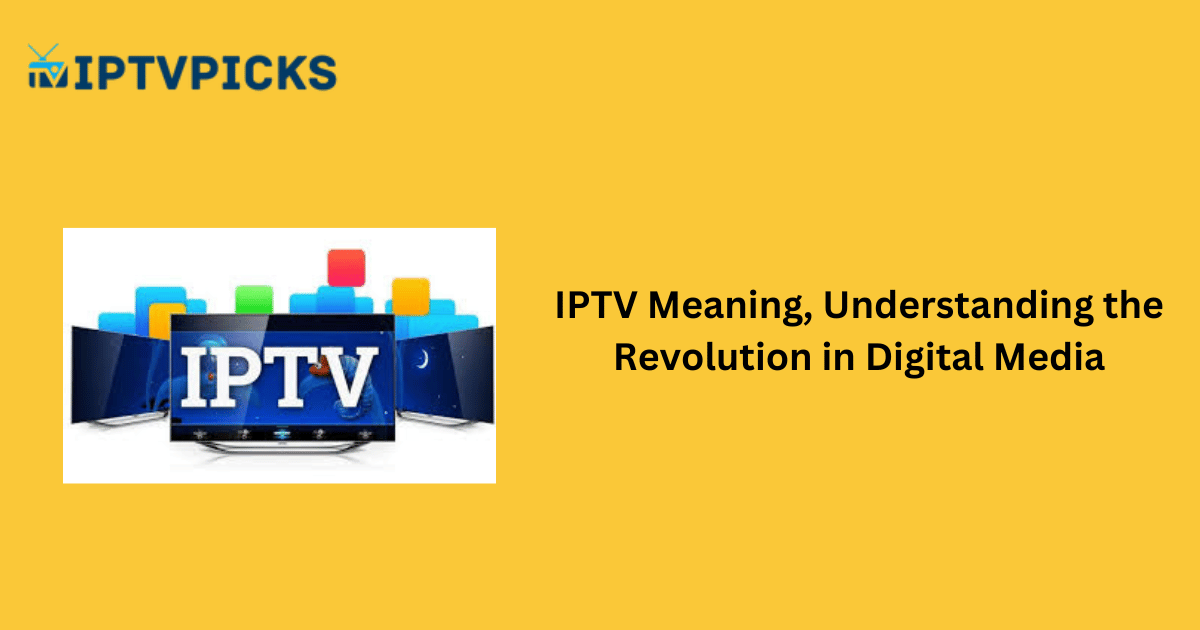For those outside the media industry, Iptv meaning may be an unfamiliar term, but most people have been using it for years and will likely rely on it even more in the future.
IPTV is a rapidly growing field, with experts predicting the market will more than double by 2029. New providers and IPTV services are emerging alongside traditional TV providers who are expanding their IPTV meaning offerings.
But what exactly is IPTV meaning? What does IPTV stand for, how does it work, and how can it enhance your TV experience? Let’s explore these questions, starting with the basics.
Table of Contents
ToggleWhat Is IPTV?
IPTV stands for “Internet Protocol Television.” Though it may sound technical, IPTV is simply a way to deliver television and video content over the internet, unlike traditional cable or satellite methods.
If you’re familiar with streaming services like Netflix or Hulu, IPTV operates on a similar concept but focuses more on live TV, catch-up TV, and Video on Demand (VOD).
IPTV vs. Traditional TV: What’s the Difference?
The key distinction between IPTV and traditional TV is how content is delivered. Traditional TV relies on fiber-optic cables or satellite radio waves. IPTV, on the other hand, delivers content through an internet connection.
Why Do People Choose IPTV?
If IPTV offers the same content as traditional TV, why choose it? The answer lies in flexibility. Here’s how IPTV offers more control:
- Flexibility in Viewing Time
Unlike cable or satellite TV, which requires you to watch shows live unless recorded, IPTV offers on-demand viewing options. This means you can request to watch a show whenever you want, without needing to set a DVR. - Flexibility in Device Choice
IPTV lets you view content on various devices, including tablets, smartphones, and laptops, not just your TV. Some cable providers offer similar app-based flexibility, but it isn’t guaranteed. - Network Flexibility
The “IP” in IPTV uses the same Internet Protocol as other internet-based services, allowing for two-way interactivity and personalized viewing experiences, unlike the one-way broadcast of traditional TV.
Do You Need a Set-Top Box for IPTV?
It depends. Older TVs may need a set-top box, such as Apple TV, Roku, or Amazon Fire TV, to decode IPTV signals. Modern Smart TVs often come with built-in support for IPTV, enabling direct network connections.
Hybrid IPTV
Some providers use a hybrid approach, combining traditional TV with IP-based services. This approach allows for expanded offerings and new services without major hardware changes, transitioning users from a conventional model to a more flexible, internet-based one.
How Does IPTV Work?
IPTV offers three main formats:
- Time-shifted Media
Also known as “catch-up TV,” this lets viewers watch recent broadcasts on their schedule, though access may be time-limited. BBC iPlayer is a popular example.

- Live IPTV
Live IPTV enables real-time streaming, ideal for sports events and news. Services like FOX Sports Go, CBS Sports HQ, and Hulu Live TV are prominent in this space.
IPTV meaning
While VOD services like Netflix and Hulu are mainstream, other IPTV formats still have potential for changing viewing habits. Live IPTV and catch-up TV are gaining popularity, with services like NOW TV and TVPlayer making inroads, especially in the sports broadcasting arena.
Where IPTV Services Have Thrived
Sports broadcasting has been a key growth area for IPTV, with subscription services offering convenient access on various devices. WWE’s recent move of its show RAW from cable to Netflix in 2025 highlights IPTV’s potential to host live events on VOD platforms, setting a trend for other live broadcasts.
Starting Your Own IPTV Service
For those interested in launching their IPTV service, partnering with established providers ensures access to necessary bandwidth, server capacity, and distribution channels. With the right content and platform, IPTV provides an opportunity for creators to reach and engage with a global audience.
The Future of IPTV
While tracking exact usage numbers is challenging, IPTV’s popularity is expected to surge. Market predictions indicate substantial growth, with IPTV projected to exceed $105 billion in market value by 2029. The rise of mobile devices and the trend toward digitalization drive this growth, with subscription-based IPTV services gaining traction.
















